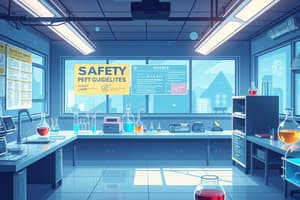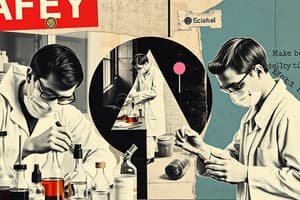Podcast
Questions and Answers
What should you do if you are unsure about the directions given by your teacher?
What should you do if you are unsure about the directions given by your teacher?
- Try to complete the task based on what you remember.
- Follow the directions from your classmates.
- Ask your teacher for directions. (correct)
- Start the activity without approval.
Why is it important to tell your teacher about any allergies or medical problems?
Why is it important to tell your teacher about any allergies or medical problems?
- So they can prepare snacks during experiments.
- To avoid participating in certain activities.
- So they can give you extra help in class.
- To ensure your safety and the safety of others. (correct)
What should you do before starting an experiment you designed yourself?
What should you do before starting an experiment you designed yourself?
- Get your teacher's approval. (correct)
- Consult with fellow students first.
- Ask for permission only if you are confident.
- Start the experiment without asking.
Which of the following is NOT a recommended safety practice in the science classroom?
Which of the following is NOT a recommended safety practice in the science classroom?
What is the best way to keep your clothing and hair safe during science activities?
What is the best way to keep your clothing and hair safe during science activities?
Study Notes
Following Teacher Instructions
- Always listen to your teacher's directions and follow them carefully.
- Ask for clarification if you are unsure about any instructions.
- Never change any procedures or start an activity without your teacher's permission.
- Obtain your teacher's approval before starting any self-designed experiments.
Acting Responsibly
- Prioritize your own safety and the safety of others.
- Immediately inform your teacher about any safety hazards (e.g., broken glass, spills).
- Report any unsafe behaviour observed in other students.
- Disclose any allergies, medical conditions, or other relevant information to your teacher.
- Avoid wearing contact lenses during experiments.
- Thoroughly read all instructions before starting an activity.
- Clean up and store equipment after finishing an activity.
Preparing for Science Activities
- Bring necessary materials like textbooks, notebooks, pencils, worksheets, and other relevant items.
- Maintain a tidy workspace.
- Wash hands thoroughly with soap and water after each activity.
- Refrain from eating, drinking, or chewing gum in the science classroom.
- Wear safety goggles or other safety equipment as instructed.
- Keep clothing and hair away from potential hazards. Roll up sleeves, tuck in loose clothing, tie back hair, and remove loose jewellery.
Studying That Suits You
Use AI to generate personalized quizzes and flashcards to suit your learning preferences.
Related Documents
Description
Test your understanding of the essential safety protocols and procedures for conducting science experiments. This quiz covers critical instructions on prioritizing safety, maintaining responsibility, and preparing effectively for science activities. Ensure you are well-prepared for your next lab session!




